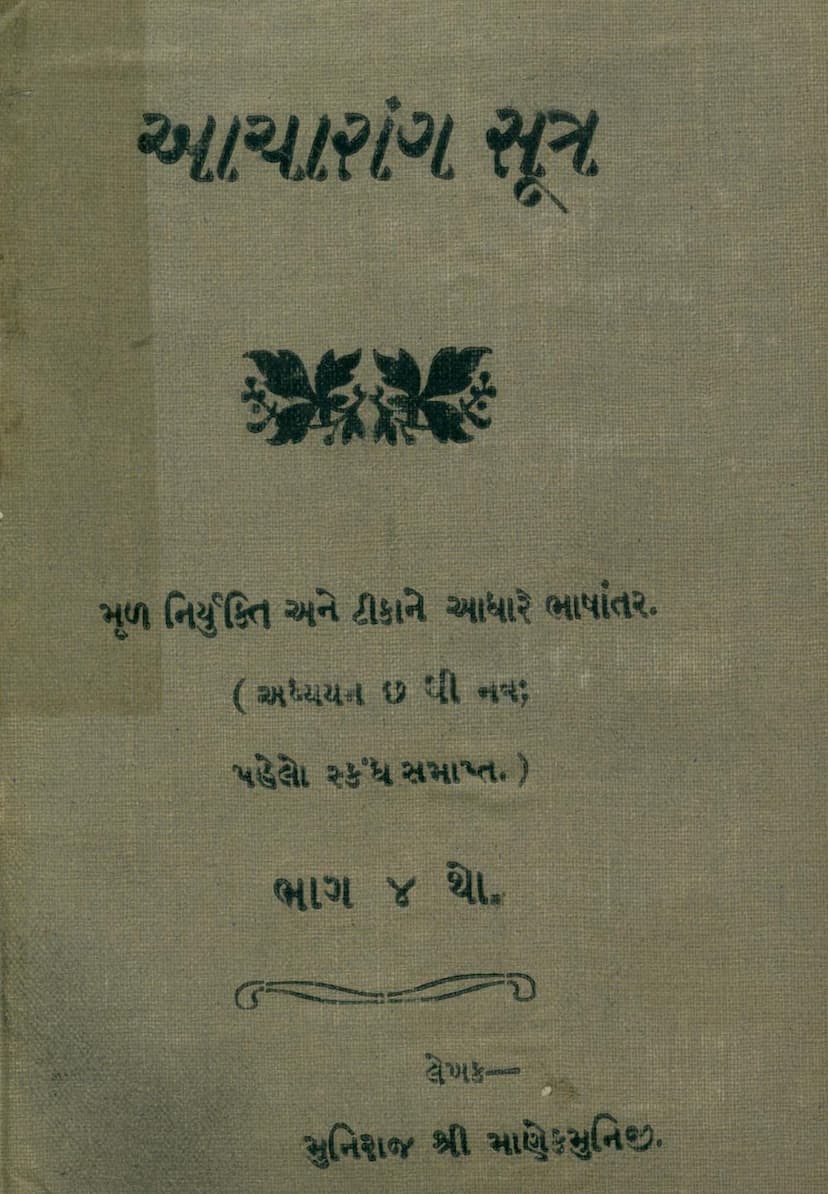Acharanga Sutra Part 04
Added to library: September 2, 2025
Loading image...

Summary
This document is Volume 4 of the Gujarati translation of the Acharanga Sutra, a foundational text in Jainism. The translation is based on the original text, Niyukti, and commentary. The author is Muni Raj Shri Manek Muni Ji. It was published by Shri Manmohanlal Jain Shwetambar Gyan Bhandar.
Key Content and Chapters:
- Part 4 of the Acharanga Sutra: This volume covers chapters 6, 8, and 9 of the first Skandha (section) of the Acharanga Sutra. The preface notes that the 7th chapter was omitted by the acharyas.
- Chapter 6 (Dhutadhyayana - The Chapter of Renunciation/Purity): This chapter focuses on detachment and the abandonment of worldly attachments, including one's body and possessions. It discusses overcoming desires and shedding karmas. It highlights the importance of overcoming karmic bonds to achieve liberation. The chapter elaborates on various types of purity, both material (like cleaning oneself of dust) and spiritual (like shedding eight types of karma). It also describes the sufferings of those who deviate from the path of righteousness and provides parables, such as the tortoise example, to illustrate the rarity of true Dharma.
- Chapter 8 (Vimoksha Adhyayana - The Chapter of Liberation): This chapter delves into the theme of liberation and the path to achieve it. It discusses the cessation of karma and the qualities of a liberated soul. It also touches upon the nature of birth and death, the cycle of suffering in different realms (hell, animal, human, divine), and the importance of mindful living and the abandonment of harmful actions. A significant portion of this chapter details the various types of suffering and diseases that beings endure in different life forms, emphasizing the futility of worldly pleasures and the need for spiritual discipline.
- Chapter 9 (Upadhana Shruta - The Chapter of Receiving/Accumulating Knowledge): This chapter focuses on the acquisition of spiritual knowledge and the importance of adhering to the teachings of the Tirthankaras, particularly Lord Mahavir. It describes Lord Mahavir's penance, his self-discipline, and his teachings on overcoming passions and attachments. It also elaborates on the different stages of spiritual progress and the qualities of an enlightened being. The chapter emphasizes the practical application of knowledge through virtuous conduct and the ultimate goal of liberation.
Themes and Concepts:
- Karmic Shedding: A central theme is the process of shedding karmas to achieve liberation. The text details how attachments, desires, and actions lead to the accumulation of karma and the importance of renunciation and purity to overcome them.
- Discipline and Penance: The importance of strict discipline, austerity, and penance is highlighted as essential for spiritual advancement. Lord Mahavir's own example of intense penance is presented.
- Renunciation: The text stresses the necessity of renouncing worldly possessions, attachments, and even the subtle ego to attain spiritual purity.
- Mindfulness and Equanimity: The importance of maintaining equanimity and mindfulness in all circumstances, especially when facing hardships or temptations, is emphasized.
- Spiritual Path: The chapters guide the seeker on the path to liberation, explaining the cause of suffering (karma and attachment) and the means to overcome it (knowledge, conduct, and penance).
- Critique of Other Philosophies: The text also engages in a critique of other philosophical viewpoints, highlighting the unique and comprehensive nature of the Jain perspective.
- The Importance of Tirthankaras' Teachings: The teachings of the Tirthankaras, especially Lord Mahavir, are presented as the ultimate guide to achieving spiritual liberation.
- The Practice of Ahimsa (Non-violence): Non-violence in thought, word, and deed is a recurring principle throughout the text.
Key Features of the Translation:
- Based on Niyukti and Tikā: The translation is enriched by referencing the Niyukti (a metrical commentary) and the Tikā (a detailed commentary), providing a deeper understanding of the original sutras.
- Emphasis on Simplicity: The translators have aimed for a simple and accessible interpretation of the text, while retaining the essence of the original teachings.
- Donations and Sponsorship: The publication acknowledges donations from various individuals and trusts, highlighting the community effort behind disseminating Jain scriptures. This includes a significant contribution from Seth Dalichand Virchandbhai, whose grandfather Seth Lakhmaji Jivanjibhai's name is associated with the "Pustakodar Fund."
- Corrections Sheet (Shuddhipatra): A corrections sheet is included, indicating the commitment to accuracy and the process of refining the translation.
In essence, this volume of the Acharanga Sutra provides profound insights into the Jain path of liberation, emphasizing self-discipline, renunciation, spiritual knowledge, and the practice of non-violence as the means to overcome karma and attain ultimate freedom.